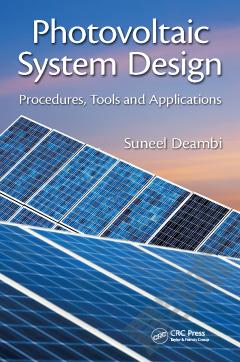Photovoltaic System Design —— Procedures, Tools and Applications
----- 光伏系统设计
Introducing a Reliable Green Technology That Can Help Improve System Performance Solely centered on photovoltaic (PV) system sizing and the tools used for PV system analysis and design, Photovoltaic System Design: Procedures, Tools and Applications emphasizes the importance of using solar PV technologies for a number of end-use applications, and examines growing interest in solar PV-based projects on a global scale. Written for the system designer/project developer/manufacturer dedicated to correctly sizing a PV system, the book outlines various aspects of PV technology, applications, and programs. It describes key attributes, system design requirements, influence on climatic and site-specific parameters, utilization of simulation procedures, and expected performance. The author includes actual case studies for system designing procedures adopted by various companies and provides a framework for working through both direct and indirect variables under the actual system designing phase. A vital resource essential to your collection, this book: Touches upon the role of renewable energy technologies in a holistic energy scenario Makes a clear categorization of off-grid and on-grid PV applications and discusses advantages and limitations Considers the potential of solar radiation availability Introduces PV system sizing procedures via the modern use of simulation softwares Presents an analysis of actual PV power plant sites when designed via the use of simulation software Determines the weak links in a PV system Photovoltaic System Design: Procedures, Tools and Applications provides a clear understanding of the issues that can affect the operation and smooth running of PV facilities and aids in determining photovoltaic system sizing procedures from a variety of end-use considerations. The book encompasses civil, mechanical, electrical, geotechnical, and power systems engineering and is useful to industry professionals involved in solar power plant design.
{{comment.content}}








 京公网安备 11010802027623号
京公网安备 11010802027623号